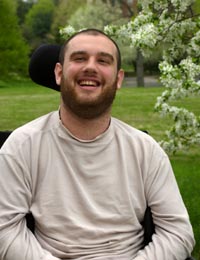|
This is an archived article.
For the latest news, go to the
Advance Homepage
For more archives, go to the Advance Archive/Search Page. | ||
|
Grad Student To Intern At D.C. Holocaust Museum Although Etai Nahary was only four years old when he moved to the United States from Israel with his parents in 1980, the UConn graduate student remains rooted in his Jewish heritage.
Nahary received a bachelor's degree in liberal arts and sciences in 2001, and is currently pursuing a master's in comparative literature and cultural studies that he expects to complete next year. Later this month, he will begin a summer internship at the Holocaust Memorial Museum in Washington, D.C., where he'll conduct a research project involving Jews who saved other Jews during the Holocaust. In a way, the research is personal. Three grandparents are Holocaust survivors. "My family's close connection to the Holocaust is what drove me initially to this project," Nahary says. His maternal grandmother was confined to the Jewish ghetto in Shaulai, Lithuania, and later survived life in a concentration camp. His Polish-born maternal grandfather joined the Russian Army, and his paternal grandfather was able to flee to Israel from the Nazi regime. His paternal grandmother was born in Israel. "I know how my grandparents deal with the Holocaust, and so I was curious to look at German-Jewish, American-Jewish, and Israeli literature to see if I'd find similar experiences," says Nahary. "I already have." In another way, Nahary himself is a survivor. As a child, he was diagnosed with cerebral palsy and his parents brought him to the United States for treatment at the world famous Newington Children's Hospital, now the Connecticut Children's Medical Center. Although the condition has confined Nahary today to a motorized wheelchair, his zest for life and his goals have helped him meet his personal struggles head-on. "As long as it doesn't snow, I do fine," says Nahary about getting around campus. "Illness does something to people," he adds. "If we're lucky, it tends to bring out the best in ourselves and in other people." On April 29, Nahary was one of two recipients of The Frances and Irving Seliger Memorial Fund Award, presented during ceremonies at the Dodd Center as part of the University's Holocaust memorial convocation program. The award was created by Joan Seliger Sidney, who works at the Center for Judaic Studies and Contemporary Jewish Life, and her husband, Stuart Sidney, a professor of mathematics, and their family and friends, to recognize student academic achievement in the study of the Holocaust. Looking beyond 2004, Nahary hopes to attend the Jewish Theological Seminary in New York City, where he'll study to become a Rabbi. "I always felt the calling," he says. |

